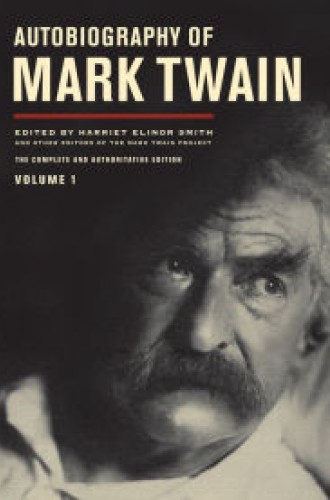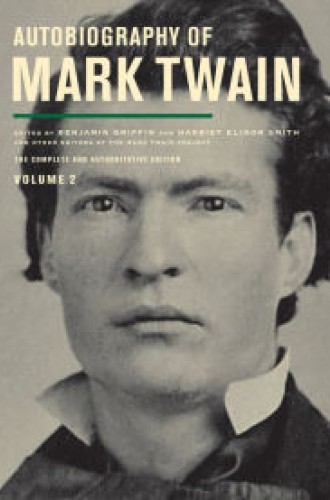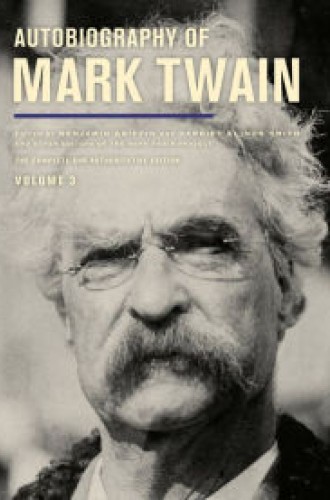So much Twain
Together, the three volumes are five inches tall and weigh more than my children did when they emerged from the sea of their mother.
Many readers who know and love the works of the astonishing American polymath Samuel Clemens—better known as Mark Twain—are vaguely aware of the story of his autobiography. Between the ages of 35 and 69, Twain tried many times to write or dictate stories of his long and colorful life, each time getting a few reminiscences or a chapter down before moving on impatiently to other projects. This was a man who wrote some 30 books, was a licensed riverboat pilot, was briefly and ineptly a Confederate volunteer, was a (terrible) silver prospector, hobnobbed with the greatest writers and social figures of his time, traveled around the world, patented three inventions, was happily married and blessed with daughters—and much more.
However, as 1906 began, he hit upon a system that finally produced a vast manuscript of more than half a million words: he hired a brilliant stenographer, Josephine Hobby, and he abandoned all thought of chronology, preferring simply to tell a tale, which reminded him of a story, which reminded him of a person, which reminded him of an adventure, which reminded him of a funny anecdote, all of which the talented Hobby would capture in full flow, complete with the pace and rhythm of Mark Twain the glorious and legendary raconteur.
Read our latest issue or browse back issues.
Thus the ur-Autobiography, which Twain insisted could not be published until a century after his death, because in the dictation he had been wholly free with “every private opinion I possessed relating to religion, politics, and men”—many of these bitter, insulting, and sure to bring public fury had they been published in his lifetime.
But after Twain’s death at age 74 in 1910, three editors had at the tremendous manuscript and produced three different versions of the autobiography, all long before Twain’s appointed ban expired. First was Albert Paine, Twain’s executor, who in 1924 published mostly what Twain had written, with very little of the late free dictation. Then came the Twain scholar and gifted writer Bernard DeVoto, who in 1940 chose what he considered the best passages from both the written and spoken material. Third was Charles Neider, who in 1959 included vast swaths of the dictation that was so far unpublished, but also cut passages that he and Twain’s daughter Clara disliked, then edited the whole thing into chronological order.
Beginning ten years ago, the Mark Twain Project at the University of California Press set out to publish the work as Twain intended it—uncut, unexpurgated, unchronological, and crammed with every scrap and flitter of written and spoken word from the man William Faulkner called “the father of American literature.” Volume one appeared in 2010, volume two in 2013, and volume three in late 2015. I have the three volumes before me; together they are five inches tall and weigh more than my children did when they emerged from the sea of their mother.
The verdict: admirable, opulent, incredibly thorough, surely a treasure trove beyond price for Twain scholars, endlessly pleasant to paw through for those of us who find Twain hilarious and moving and blunt and inimitable—but probably not, on the whole, worth the $135 to buy them new and the five inches of shelf space to store them. I say this with real respect and something like awe for editors Harriet Elinor Smith and Benjamin Griffin and their many editorial colleagues. Their accomplishment is inarguable, and I have already spent many happy hours flipping the volumes open at random and often being rewarded with America’s greatest writer at full and furious roar.
Passages I had never read before include this burst from June 20, 1906:
There is one notable thing about our Christianity: bad, bloody, merciless, money-grabbing and predatory as it is—in our country, particularly, and in all other Christian countries in a somewhat modified degree—it is still a hundred times better than the Christianity of the Bible, with its prodigious crime—the invention of hell. Measured by the Christianity of to-day, bad as it is, hypocritical as it is, empty and hollow as it is, neither the deity nor His Son is a Christian. . . . Ours is a terrible religion. The fleets of the world could swim in spacious comfort in the innocent blood it has spilt.
And there is a wonderful, long elegy to the house fly (September 4, 1906), a lovely memory of his mining friend Jim Gillis (May 26, 1907), and entertainingly caustic comments on the impulsive show-off Theodore Roosevelt (January 10, 1906). You see the pattern.
But for every nugget there is a slog, for every laugh a plod; for every hilarious take on the common buffoonery and connivance of his fellow human beings, there are long treks through business and politics and details of villas visited. It is both enough and too much, this complete and thorough autobiography. It is both a wonderful ocean of stories and opinions from one of the most original and honest and funny Americans who ever lived, and a gloriously unkempt drawer in which you must rummage endlessly to find new bits of Twain’s wit and fury.
Conclusion: If you are a Twainian, absorbed by “the first truly American writer” (Faulkner again), then you will swim happily in the Complete and Authoritative the rest of your life. For those who have never read the autobiography at all, though, I would still recommend Neider’s edition first, partly for the fact that you can carry it in your pocket to the beach, to the meadow, or to the church picnic. And then if you want to plunge ever deeper into the tart and cheerful mind of Mr. Clemens, dive into the Library of America’s great two-volume Mark Twain: Collected Tales, Sketches, Speeches, and Essays.
Best of all, if you have not read Twain in a long time, is to return to his peak work—not Huck Finn, in which I think Twain lost interest and ended it any which way, but Tom Sawyer (eternally a classic), Roughing It (in which Twain finds his voice), and Life on the Mississippi (funny, informative, and still as good a nonfiction book as I have ever read). Then perhaps explore the many wonderful writers influenced by Twain’s honesty and humor and uproarious use of the American language: Saul Bellow (The Adventures of Augie March), Faulkner (The Bear), Ernest Hemingway (any of the short stories), Cynthia Ozick (The Puttermesser Papers), Toni Morrison (Beloved), John Steinbeck (Tortilla Flat). And then rest; you’ve earned it.









